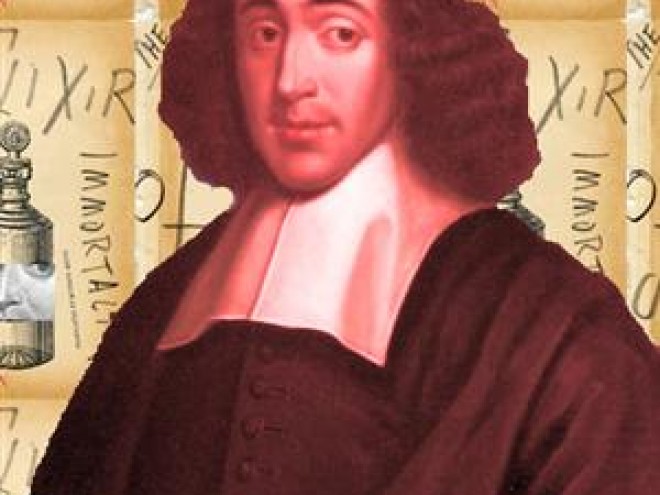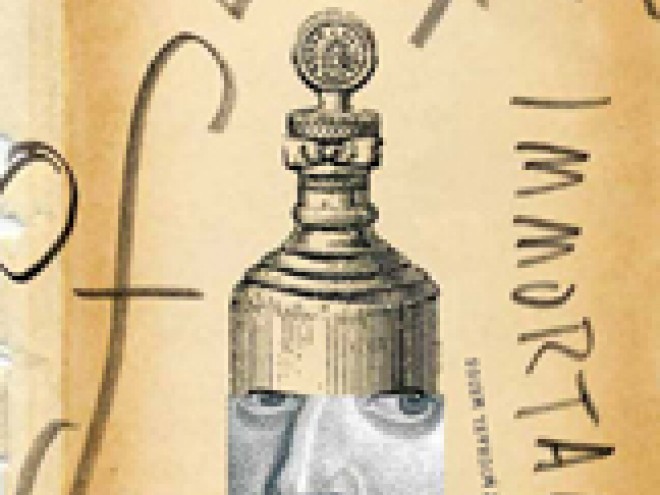Earlier this week, Gabi Gleichmann wrote about his fascination with reading and writing. His debut novel, The Elixir of Immortality, is now available from Other Press. He will be blogging here all week for Jewish Book Council and MyJewishLearning.
 I left Stockholm in the fall of 1998 and moved to Oslo, for I had discovered the neighboring land’s greatest natural resource. No, not oil. Better than that: a woman from Norway.
I left Stockholm in the fall of 1998 and moved to Oslo, for I had discovered the neighboring land’s greatest natural resource. No, not oil. Better than that: a woman from Norway.
Falling in love is the most intense encounter in life. One perceives one’s true profile and gains authentication through other human beings. Someone else understands who you are, and this fact opens to you the possibility of understanding your own potential and your limitations. The face of that other person approaches yours, intimate and familiar. One’s world is always represented by another person.
We married. And we had children: three boys. The decade that followed, a time of genuine happiness, flew by all too quickly; we were hardly aware that beyond the circle of our little family a complex and constantly changing world still existed. I was overjoyed no longer to be engaged in public debate and publishing commentaries. The existence I shared with our children gave me wings; I soared high above the earth where I was freer and more open than ever before. I learned that everything is possible and that only our self-imposed constraints hold us prisoner.
Then one day a letter appeared in the mailbox. It came from my wife’s uncle, an elderly aristocrat living in a fortified ancestral manor and dedicating himself to the study of family genealogy. He had sent us a family tree outlining 350 years of Cappelen family history in Norway in the tiny county of Telemark. He was asking my wife to add our names and birthdates to it. I was astonished. I knew that the lineages of purebred dogs and racehorses were carefully recorded. But I’d never seen anything of the kind for human beings.
My wife said it was like a treasure map: It offered the children the chance to trace the lives of their Norwegian ancestors. I responded that a family tree was hardly an adequate opening into ages past, considering that it consisted of only names and dates. It held nothing of what really constitutes a human life: no achievements, no reflections, no dreams; no desires or longings. None of the ambitions, disappointments or successes; no family stories or anything else. No flesh and blood. No keys to open the way to the realities of the lives of earlier generations.
My spouse thought I was simply jealous. I couldn’t offer any family tree of my own. For centuries fate and history had pushed my Jewish ancestors back and forth across the different lands of Europe. They’d never had the possibility of putting roots down anywhere. And besides, the brutal rise of Nazism had liquidated almost all of my family. I had no paternal grandparents or elderly family members to initiate me into our past.
I suddenly realized that my own children needed to know more about their Jewish roots, to learn about their DNA, that physical inheritance that had given shape to their bodies and the blood circulating within them. Being a Jew in a country such as Norway, a land of only a thousand Jewish souls, is no easy thing. Especially considering that our family observes none of the traditions. What would be the best way for our children to learn about their Jewish heritage and the complex identity it entails?
Then I had an inspiration. I told my wife I was determined to give our boys a present: a Jewish family tree, one that was even more extensive that the 350-year history of the Cappelen family. It would go back a thousand years. I would create it with my pen and my imagination. After all, the lives and undertakings of all those others were still alive within me. All of us are itinerant time machines; our recollections enable us constantly to travel back and forth in time, through our own lifetimes and throughout history as we summon bygone eras into our own present. The memories of the departed and the disappeared remain alive and well, pulsing beneath the surface of our own days.
I also reminded myself that only the art of the novel is capable of bringing back to life the dead and the forgotten, history’s myriads of anonymous individuals, by giving them faces once again and erecting a memorial over them.
Everything went with blinding speed after that. The years spent at home with my boys had allowed me to develop and mature into a child once again: I had regained the openness of childhood, the ability to concentrate upon pure play and the belief that nothing could stand in my way once I had set a goal for myself. My novel The Elixir of Immortality was on its way to the light of day.
In the course of writing it I also became aware of one of my most powerful intellectual motivations: the desire to bring back to life the culture of the secular European Jewish Diaspora. The murderous barbarism of the Nazis had not only exterminated six million Jewish lives; it had additionally dealt a nearly fatal blow to Jewish culture in Europe, for after the war countless Jewish survivors had turned their backs on the desolation and started new lives in Israel and in the Americas. For all of my grown life I’d been striving to revive secular European Jewish culture, with the thought that like the Phoenix it could be born anew from its ashes.
In The Elixir of Immortality I wanted to speak factually but with passion of the significance of the tiny Jewish minority and its contributions to Europe and the world over the past thousand years. Obviously, no one can evoke any more than a tiny fraction of that uniquely rich history. My own task was simply to decipher and bring to light just a few stories hidden beneath the grime and the deliberately obscured layers of European history, stories completely neglected in books written by the victors.
It’s impossible to cram all the lives of thirty-six generations into a novel of just over 700 pages. That’s why my story makes no pretense of presenting a coherent, exhaustive account of a Jewish family. What I wanted to achieve with my almost entirely invented characters was to call attention to the fact that we humans have forgotten how to remember the way things once were in our part of the world. And, with my tall tales, I wanted to move my readers to laughter and to tears.
Check back here all week for more from Gabi Gleichmann.


